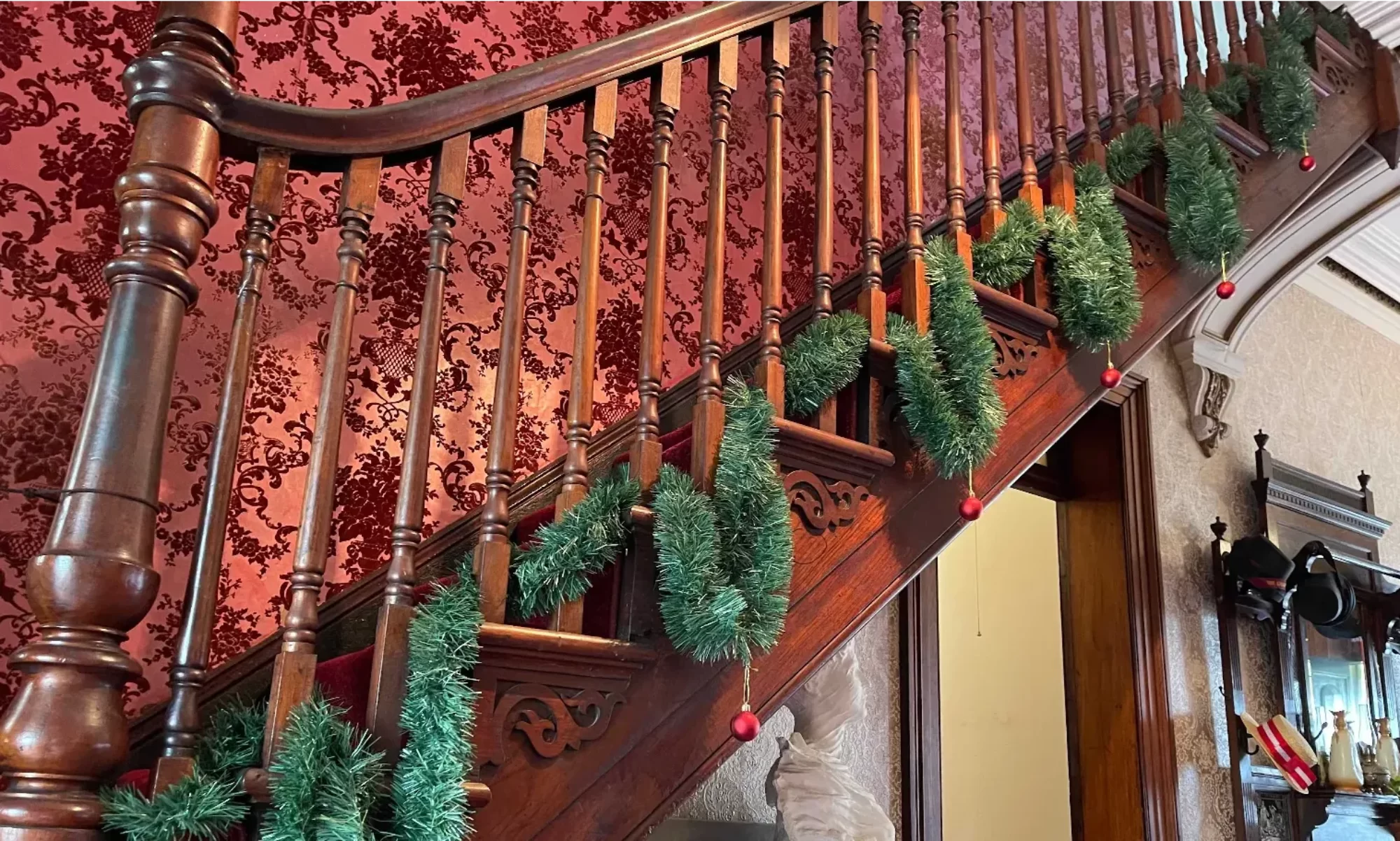by Jean Scott
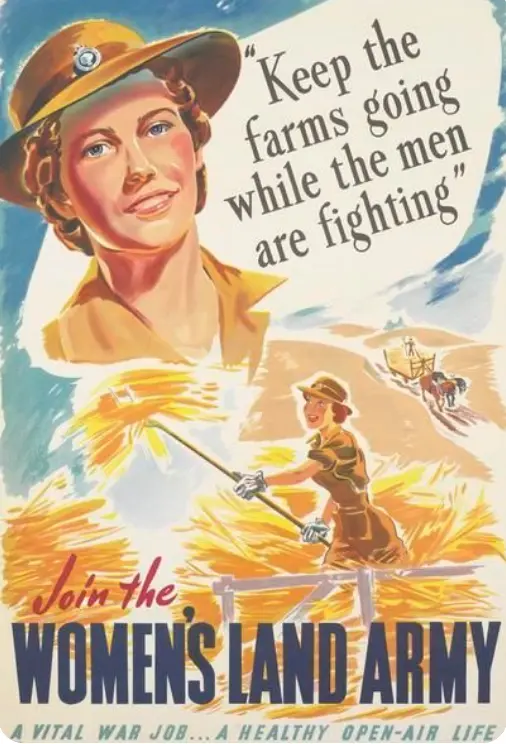
During World War II thousands of Australian women joined the Women’s Land Army. Their task was to tend the farms while the men went to war. Their contribution to the war effort has been largely overlooked.
In 1991, Jean Scott recounted their achievements, experiences and tribulations in a presentation to the SGHS.
An excerpt from Jean’s book, Girls with Grit:
Local enthusiasm in Gosford resulted in a cottage and grounds at the Forest nurseries, adjoining Narara Creek (north of Gosford, NSW), being allocated to the Women’s Australian National Service (WANS) for a training camp. At the beginning of November 1941 about twenty women took up residence, but the supervision was lax, and discontent and disorderly conduct resulted in the matron being replaced by Matte Travers, who tells a remarkable story of leadership and sheer hard work:
I attended the meeting at Sydney Town Hall the night the WANS were formed and offered my services as voluntary cook, to go overseas if called upon. Each Saturday afternoon I went to the training sessions at Burwood Domestic Science School, and in the evenings I worked as a voluntary cook at Air Force House in the city. This was quite an exhausting job, without the benefit of air-conditioning; I was on duty from 5pm until 10, in my WANS uniform, even having to pay for a cup of coffee if I needed one.
At one of the WANS weekend camps while I was acting as quartermaster, the straw failed to arrive for our palliasses and our canvas cots were quite cold. Using my initiative, I filled an empty biscuit tin with hot water to warm my bed. Little did I know then there would be many more instances where even greater inventiveness would be required.
I had been asked to take charge of the canteen at Concord Military Hospital, but a call from WANS headquarters suggested I might be interested in going to their Land Service camp at Gosford. A rosy picture was painted: I was to be promoted to captain at £2/10 (2 pounds and 10 ten shillings) per week plus keep, a sergeant and two orderlies (who would bring my morning tea and run my bath) would help me with various duties about the camp. It sounded quite agreeable to me, so I resigned from my place of business, packed, caught the train for Gosford and then took a taxi to the Forest Nurseries Camp, arriving at 4pm. As I stepped from the cab I noticed a group of girls in khaki overalls standing by the gate and I smiled at them. I heard one say, “She’s not much more than a kid.” Then Mrs Beveridge and other members of headquarters (HQ) staff came and hurried me inside. Apparently, the person who had been supervising had proved unsatisfactory, allowing the girls to do as they liked, and she had been dismissed. The girls in turn had thrown their badges on the table, spat on them and declared that they’d “take no orders from any bloody officer”. The group at the gate had intended to pelt me with rotten tomatoes and throw me in the creek.
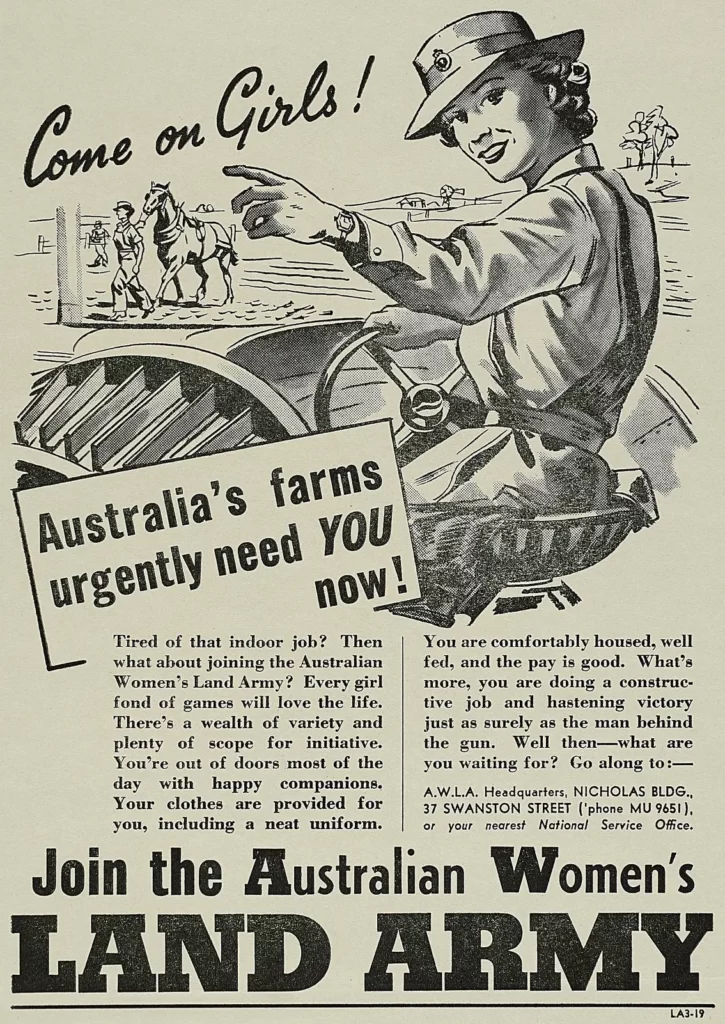
The official party left for Gosford, leaving the sergeant and myself to deal with the girls, who were still outside. Slowly, one by one, they knocked at the door and I spoke to each in turn, telling them I would accept them if they would obey my orders; most were crying and I was feeling quite exhausted. By 10pm all but two, who were rather undesirable anyway, had returned to the fold. I then made a quick inspection of the long, dark and narrow kitchen and was horrified to find, in the pantry, bags of rice moving with weevils, and pounds of cheese creeping with maggots, more of which were beneath the sink top. In the laundry, 40 sets of government-issue bed linen was waiting to be washed in a wood-fire copper, and every window was filthy and uncurtained. I told the sergeant we would begin work at four the next morning.
Those who had jobs to go to left after a scratch breakfast; the others I set to work helping to clean up while I got busy with the washing. Halfway through all this, Mrs Beveridge rang to ask me to meet her in Gosford to be introduced to the local tradesmen, and after a hectic morning the HQ officials left for Sydney. With them went Amy Pickering, who was to have opened a camp in Wamberal but owing to lack of work in the district was reallocated, and so I was minus my sergeant. Very dispirited, I returned to the cottage, which was set in lovely surroundings with gardenias in bloom and a beautiful fernery – such a contrast to the interior I was about to face.
I told the girls the camp was to be in order by 13 December for the official opening, and I said I would be working as hard as everyone else to bring our quarters to liveable conditions. They pulled their weight when they saw I was as good as my word. The whole place was in a disgusting state, each area revealing filth that took hours of scrubbing to clean. I found some yards of net in a cupboard and with the aid of an old treadle sewing machine made curtains; a length of damask became a tablecloth. Two of the girls and myself varnished the floor and some old jars filled with gardenias gave the room a much more pleasant aroma. We were determined to make a good impression on the opening day. The girls canvassed donations from the local folk, set up and decorated stalls and practised marching each morning before breakfast. Through our combined effort, all was in readiness and we had all become very good friends.
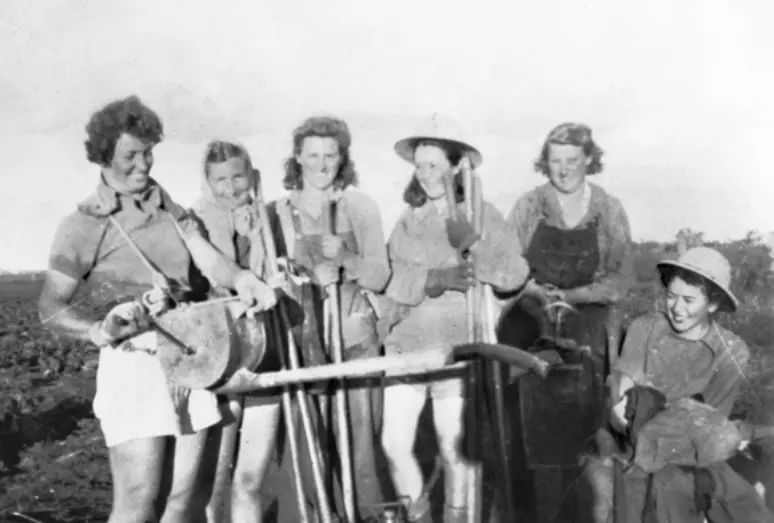
Clive Evatt officiated at the unveiling and I marched at the head of the girls to the platform. Many of the local people came along and the staff from headquarters were most surprised when they saw the changes we had achieved in such a short time. Later I heard from HQ that the girls had written a letter expressing their appreciation of me, as they had expected an old, tough, army-type officer who would boss them about. This lifted my spirits indeed, for my earlier pretty picture had most certainly faded by now.
In the following week I spent some time trying to find work for the girls as they were all fairly broke; it was not possible to keep anyone to act as orderly, so I continued to cook and clean alone. A number of chickens were running loose on the property with many roosters among them, so we made an effort to sell some, unfortunately without much success. The next best thing was to use them ourselves and so chicken became a regular part of our diet, thanks to an Aboriginal girl who was an expert with an axe.
At Christmas most of the girls went home, leaving only six or seven for our festive dinner of the usual poultry; however, I made a pudding and a cake for the occasion. During this period I was given permission for the kitchen to be enlarged, with windows the full length of it and benches for preparing meals and cutting lunches. Card tables were ordered which gave us a more homelike appearance, and in the New Year I planned to train an orderly to assist me. This was not without incident, as I recall. One day the butcher had delivered two large meat orders and left them on the bench. I asked the orderly to prepare the vegetables, wrapping the peelings in newspaper before placing them in the incinerator. Later, unable to find the parcels of meat, I asked if she had moved them; she made a dash for the door – she had thought they were also rubbish! To our even greater consternation we found she had mistaken the bin of liquid manure for the incinerator; we quickly dragged the meat parcels out. Thank goodness the wrappings were quite thick and the liquid had not penetrated, but I was very distressed and angry so I set her to washing all the meat thoroughly. I also left her to make the evening meal as I just couldn’t face dinner that night, and went into town.
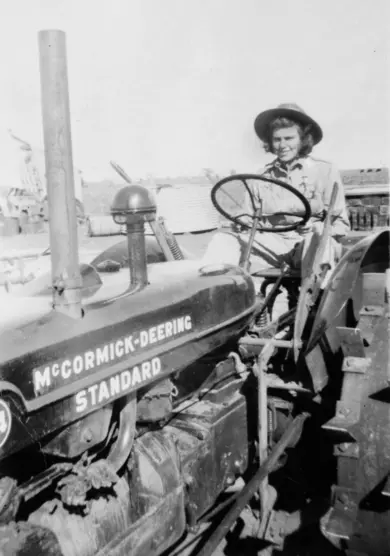
During the last weeks of January I received a phone call from HQ informing me that they were opening camps at Batlow, Leeton, and Griffith and needed my help. I asked for a wage increase, and to return to Gosford, and also to be allowed to recruit some of the girls I had come to know. They agreed to all my demands, their manner implying I was their No. 1 officer, so I arranged for ten of the girls to follow and I left for Sydney. It was hard to leave the others behind after all the things we had been through together.
We continue the story in Batlow.
Autumn was approaching when I received a telegram from HQ to inform me of the arrival of a further 32 girls on the following Monday. I was to buy stores and equipment from Batlow’s two shops and take over the new Returned and Services League of Australia (RSL) building (not yet finished), which would be my headquarters as Central Camp, while the new matron would move into Atkinson’s. The next day Mr MacKenzie called for me and a few of the girls and drove us to the scouts hall in the township. This old hall was donated to the Land Army for as long as they required it, to be used as a messroom in conjunction with the RSL. These two buildings were in different streets, and about 150 yards apart; this I knew would present an additional problem for staff and girls going to the early-morning breakfasts, especially in the winter months ahead.
The only furniture was a few long trestle tables and low forms previously used by kindergarten children. We nailed wooden blocks to the latter to raise them; everything else we swept, dusted and scrubbed. Once more there was just one small fuel stove, so I placed iron bars on bricks in the large open fireplace where dixies could be set, and outside I had a trench dug as a firepit with more bars across the top. It was primitive but functional. The night before the new recruits arrived, I cooked a large piece of corned beef to have cold with salad, and in the morning I made a dixie of custard into which I cut bananas, as a dessert. At midday I met the group and escorted them to the scouts hall for lunch and then to their quarters, leaving them to unpack while I took Miss Ashdown to Atkinson’s camp and introduced her to the girls quartered there. On returning to my room in the unlined building I overheard the girls discussing their accommodation; they all appeared to be of a mind to stay only as long as it took to make the money for their fare home. I felt distressed for them, as it was certainly a pathetic place for anyone, but there were orchardists waiting to speak to me about the distribution of the girls and I was kept too busy to try and give them any comforting words. The straw for our palliasses was not delivered until late so it was quite dark and cold by the time we got to bed; that too was a restless night for everyone as the wandering cows tramped around our unfenced yard, eating the straw left lying there.
The bathroom had one old bath, at least a hundred years old, a chip heater and two enamel wash bowls. On the way home from work the girls gathered bark and chips to feed the heater; the first in had clean water, then more chips and water were added as those following bathed. I bought a large bowl and washed in my room as best as I could, for I could not face getting into that old galvanised tub. Another of our problems was the condensation which gathered on the unlined roof and dripped onto the beds. If it rained, raincoats and umbrellas were used in the dormitory in an effort to keep clothes as well as beds dry.

One lonely girl was about to celebrate her 21st birthday and with the help of the other girls we arranged a surprise party for her. I hired a radio, made sausage rolls, sandwiches and cakes; we set the tables in the dormitory where everyone had a happy evening, drinking her health in cordials. The next day Esther presented me with a box of Nestle’s Winning Post chocolates; she told me that her early life had been quite unhappy, but the friendliness of the girls and my understanding way had helped her a great deal. My room was large with a big fireplace, so on wintry nights I would make a dixie of cocoa and invite “my brood” to join me for supper. They’d bring rugs and pillows and sit about the floor singing and telling stories until lights-out. We were asked to join the Anzac Day services with the townspeople, so I trained the girls to march and made a wreath. We assembled at the Institute Hall on 25 April and marched to the memorial gates. I felt we made a favourable impression, considering the small amount of time we could devote to drill, and the fact most of the girls, weary after their day’s work in the orchards, were ready to relax rather than practise marching.
With the demand for more girls in the district, another camp was to be opened on Bert Herring’s property,”Wybalena”, so I went out to make an inspection. I was appalled at what I saw: an old hay shed with horses still housed there, smelling of sweat and manure, the sleeping area in a loft with broken windows and evidence of rat infestation. I protested at the conditions, but my superior officers from HQ thought otherwise, so I ordered the carpenters to make cupboards and flyproof safes. The girls, with Mrs Whistler, moved in and the next day I went out to see how they had fared. Paper and hessian pieces were stuffed in the broken windows and cracks; rats had already chewed their clothing and they were terrified. Mrs Whistler had moved her bed outside I was disgusted, unable to believe anyone could pass this building as fit for human habitation. The girls were brave to withstand such treatment and to continue doing such a wonderful service for the country.
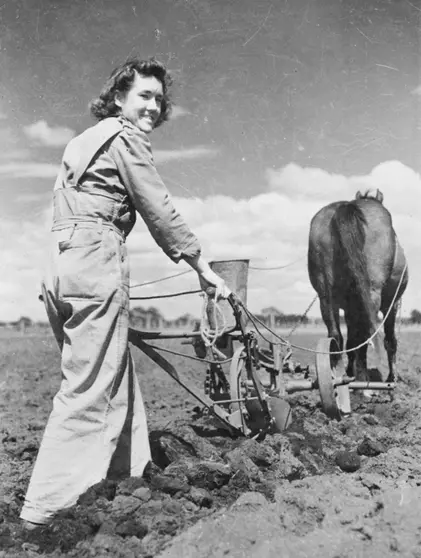
The next advice from HQ instructed me to prepare the camps for a visit and inspection by the governor, Lord Wakehurst, his wife and party. Mrs Lynch arrived the day before to make sure all was ready, bowls of flowers were placed on the tables in the dormitory and I was told on no account to allow the official party to see the loft at Wybalena. The inspection proceeded quite well as we toured Central, Atkinson’s, and the packing house, where Lord and Lady Wakehurst met and spoke to a number of the girls, showing a great deal of interest in everything, but at Wybalena Lady Wakehurst insisted on seeing where the girls slept. When she descended the ladder she said nothing, but the expression on her face spoke volumes. Later she took me aside and said, “No doubt the flowers around the place are for our benefit”. I told her that this was so but also about our fireside singsong gatherings and she seemed pleased to hear of this and was especially kind to me for the rest of the tour.
Afternoon tea had been prepared by the ladies of the Red Cross and Mrs Lynch said I could be excused from attending anything further, but H.V. Smith insisted, “Oh we must have Captain Travers with us at the official table”. Finally the visitors were farewelled from the hotel and “H.V.” offered to call for me that evening to escort me to the dance being held at the Institute Hall. This appeared to make Mrs Lynch very cross – no doubt she had been expecting she would be his partner. However, if the Land Army was to be accepted in the district where I was to be the senior officer-in-charge, it was important for me to meet as many of the townspeople as possible for the girls’ benefit.
This article was first published in the August 1991 edition of our magazine.
Browse the magazine archive.
